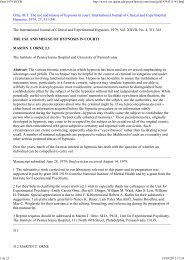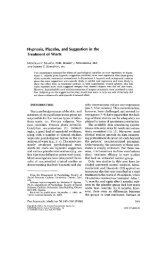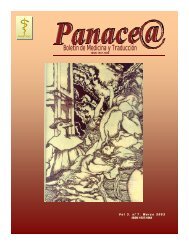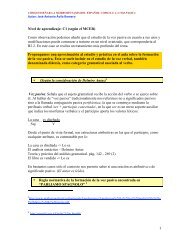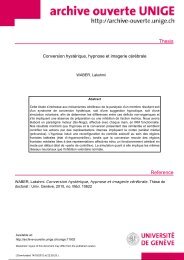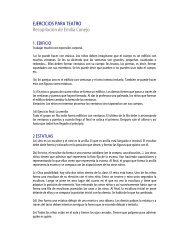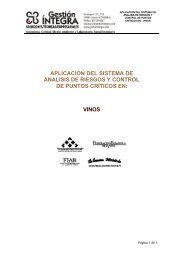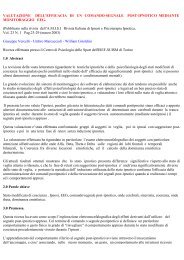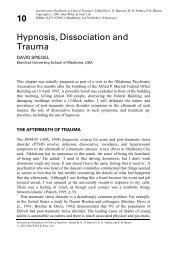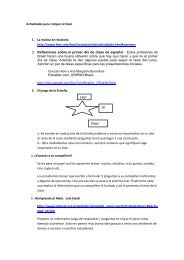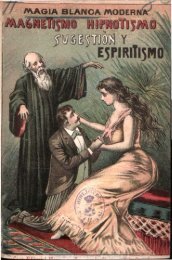Diccionario etimológico comparado de la lengua castellana
Diccionario etimológico comparado de la lengua castellana
Diccionario etimológico comparado de la lengua castellana
You also want an ePaper? Increase the reach of your titles
YUMPU automatically turns print PDFs into web optimized ePapers that Google loves.
Perv-ir. a.<br />
Cfr. etim. febrero.<br />
SIGN.— ant. hervir.<br />
Ferv-or. ni.<br />
:<br />
PUKVl I^ESTI 2587<br />
Cfr. etim. p'ervir.<br />
SIGN.— 1. ant. hervor.<br />
2. Calor vehemente; como el <strong>de</strong>l fuego ó<br />
el <strong>de</strong>l sol<br />
Las que se van mas llegando al Sol... sobrepujan en<br />
participar mas el fervor <strong>de</strong>l Sol. Acost. H. Ind. lib.<br />
2, cap. 2.<br />
3. íig. Celo ardiente y afectuoso hacia <strong>la</strong>s<br />
cosas <strong>de</strong> piedad y religión :<br />
En los que nos ayudaban ponía el Señor tanto fervor,<br />
que cada uno lo tomaba por cosa tan propia suya, como<br />
si en ello les fuera <strong>la</strong> vida. Santa Ter. V. cap. 36.<br />
4. fig. Eficacia suma con que se hace una<br />
cosa.<br />
Fervor-ar. a.<br />
Cfr. etim. fervor. Suf. -ar.<br />
SIGN.—AFERVORAR.<br />
Fervor-ín. m.<br />
Cfr. etim. fervor. Suf. -tn.<br />
SIGN.— Cada una <strong>de</strong> <strong>la</strong>s breves jacu<strong>la</strong>torias<br />
que se suelen <strong>de</strong>cir en <strong>la</strong>s iglesias, con ^especialidad<br />
durante <strong>la</strong> comunión general. Ú. m.<br />
en pl,<br />
Fervor-izar. a.<br />
Cfr. etim. fervor. Suf. -har.<br />
SIGN.— ENFERVORIZAR. Ú. t. C. T.'.<br />
Entonces empieza á fervorizarse el alma con vivos<br />
<strong>de</strong>seos <strong>de</strong> ver tu c<strong>la</strong>ridad. Nier. Ex. Am. D. § .32.<br />
Fervorosa-mente. adv. m.<br />
Cfr. etim. fervoroso. Suf. -mente.<br />
SIGN.—Con fervor. Ú. m. en lo moral :<br />
Tan fervorosamente que <strong>de</strong>safiaban á <strong>la</strong> tyranía. Arg.<br />
Mal. lib. 4, pl. 138.<br />
Fervor- OSO, osa. adj.<br />
Cfr. etim. fervor. Suf. -oso.<br />
SIGN.— Que tiene fervor activo y eficaz:<br />
Fervorosa <strong>de</strong>voción y religiosa mo<strong>de</strong>stia en años <strong>de</strong><br />
suyo tan ver<strong>de</strong>s. Alcaz. Chr. <strong>de</strong>c. 1, año 2, cap. 2, § 3.<br />
Fesceni-no, na. adj.<br />
ETIM.— Del <strong>la</strong>t. Fescen-n-ja, Fescenn-r'um,<br />
Fescennio, ciudad <strong>de</strong> Etruria, al<br />
norte <strong>de</strong> Palería (= grg. Oaaxév-iov), <strong>de</strong><br />
don<strong>de</strong> se <strong>de</strong>r. fescenn-inus, -ina, -inum,<br />
(cfr. suf. -inus = ino)\ perteneciente á <strong>la</strong><br />
ciudad <strong>de</strong>Fescennio. En \^\xlv./escenn-ini<br />
füersus), versos, canciones libres, satíricas<br />
y obscenas que se cantaban en <strong>la</strong>s<br />
bodas, así dichas porque fueron inventadas<br />
en Fescennio. Derívase Fescennio<br />
= Fesc-en-n-iuni <strong>de</strong>l grg. ac7y.-£v-iov,<br />
<strong>de</strong>l verbo fá-ax-w, hab<strong>la</strong>r, char<strong>la</strong>r, y luego,<br />
componer, hacer versos; cuya raíz<br />
'fa-, hab<strong>la</strong>r, enseñar, hacer saber y sus<br />
aplicaciones cfr. en fá-b-u<strong>la</strong>. Etimológ.<br />
Fescennio significa ciudad <strong>de</strong> <strong>la</strong> char<strong>la</strong>,<br />
<strong>de</strong> los chistes y fescen-ino, perteneciente<br />
á Fescennio. Le correspon<strong>de</strong>n: franc.<br />
fescennin; ital. fescennino; ingl. fescennine;<br />
povt.fescennino, etc. Cfr. hab<strong>la</strong>r,<br />
HABLADOR, etC.<br />
SIGN.— 1. Natural <strong>de</strong> Fescenio Ú. t. c. s.<br />
2. Perteneciente á esta ciudad <strong>de</strong> Etruria.<br />
3. V. VERSOS FESCENINOS.<br />
Festa. f.<br />
Cfr. etim. fiesta.<br />
SIGN.—ant. fiesta.<br />
Feste-ante.<br />
Cfr. etim. festear. Suf. -ante.<br />
SIGN.— p. a. ant. <strong>de</strong> festear. Que festeja.<br />
Fest-ear. a.<br />
Cfr. etim. festa. Suf. -ear.<br />
SIGN.— ant. festejar;<br />
Con bailes y con danzas le festea. Pinc. Peí. lib, 1,<br />
oct. 81.<br />
Festeja-dor, dora. adj.<br />
Cfr. etim. festejar. Suf. -dor.<br />
SIGN.— Que festeja. Ú. t. c. s. :<br />
Estuve algunos días hecho caballero festejador j recibidor<br />
general <strong>de</strong> quanto me daban. Esteb. cap. 9.<br />
Festej-ante.<br />
Cfr. etim. festejar. Suf. -ante.<br />
SIGN.— p. a. <strong>de</strong> festejar. Que festeja y<br />
obsequia á otro<br />
:<br />
V. M. <strong>de</strong>sea que yo sea su nove<strong>la</strong>dor, ya que no puedo<br />
ser su festejante. Lop. Gire. f. 136.<br />
Festejar, a.<br />
Cfr. etim. festejo. Suf. -ar.<br />
SIGN.—1. Hacer festejos en obsequio <strong>de</strong> uno;<br />
cortejarle :<br />
Todos ellos festejaban estos días, honrando <strong>la</strong> venida<br />
<strong>de</strong> su Pastor. Fr. L. Gran. Symb. p. 2, c. 20, § 5.<br />
2. ga<strong>la</strong>ntear:<br />
Hallo un hombre en el jardín. Que dicen que <strong>la</strong> festeja.<br />
Mart. Com. Pr. M. jorn. 3.<br />
Fest-ejo. m.<br />
Cfr. etim. festa. Suf. -ejo.<br />
SIGN.— 1. Acción y efecto <strong>de</strong> festejar:<br />
El inglés solo atendía al festejo y regalo <strong>de</strong> Poliar<br />
cho. Pell. Arg. part. 21 fol. 88.<br />
2. ga<strong>la</strong>nteo,<br />
Festeo. m.<br />
Cfr. etim. festa. Suf. -eo.<br />
SIGN.—ant. festejo.<br />
Fest-ero. m.<br />
Cfr. etim. festa. Suf. -ero.<br />
SIGN.— El que en <strong>la</strong>s capil<strong>la</strong>s <strong>de</strong> música<br />
cuida <strong>de</strong> ajustar <strong>la</strong>s fiestas, avisar á los músicos<br />
para el<strong>la</strong>s, y satisfacerles su estipendio.<br />
Fest-ín. m.<br />
Cfr. etim. festa. Suf. -in.<br />
SIGN.—1. Festejo particu<strong>la</strong>r en una casa,<br />
con baile, música, banquete ú otros enlrelenimientos:



